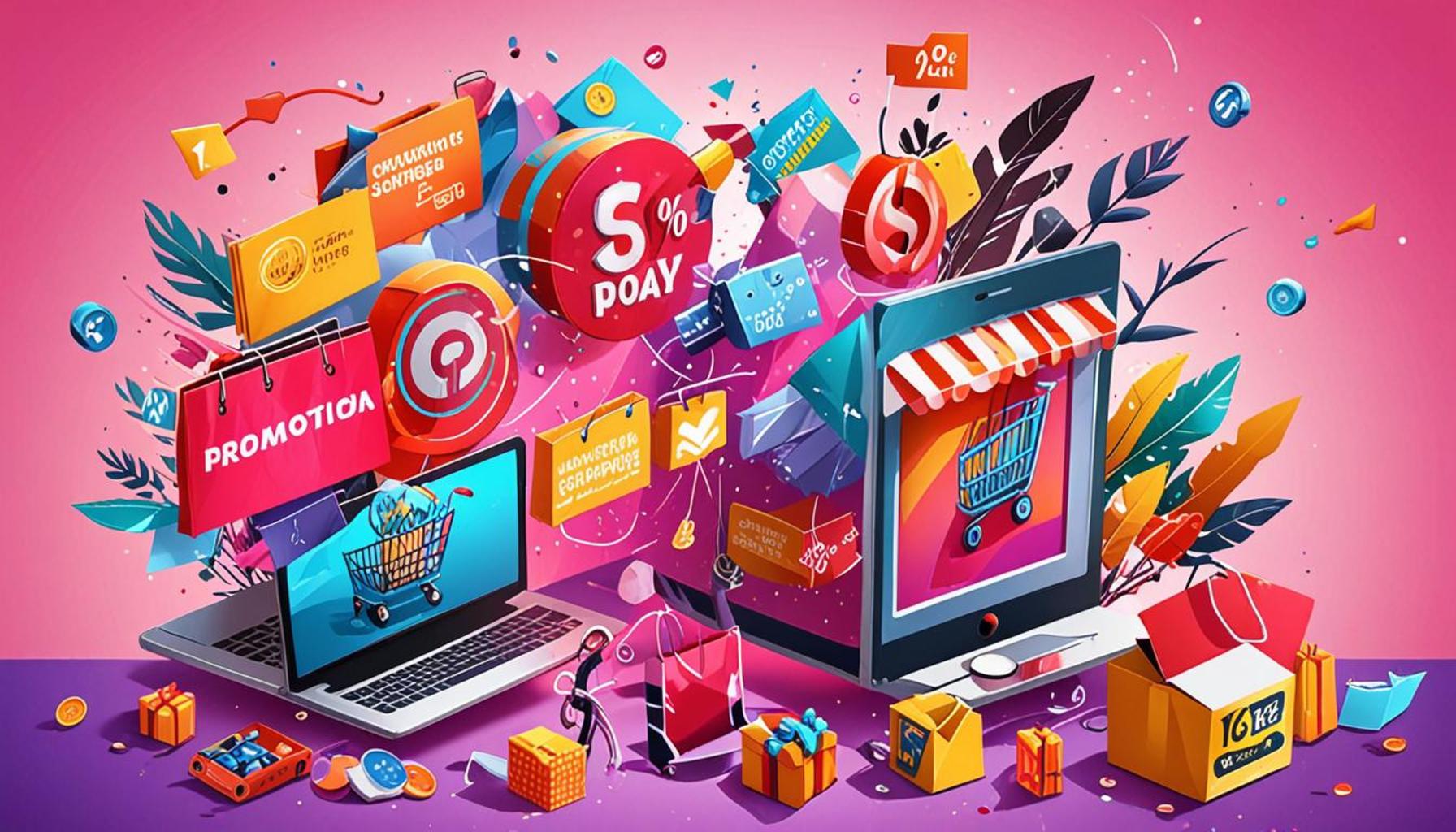Promotion Policy Strategies to Increase E-commerce Conversion

Unlocking E-commerce Success
In today’s fast-paced digital marketplace, the key to thriving lies in effective promotion policy strategies. With countless options available at a consumer’s fingertips, e-commerce businesses must constantly adapt to capture attention and boost conversion rates. Understanding the right promotional tactics can mean the difference between a visitor merely browsing and making that all-important purchase.
Effective Strategies to Consider
There are several promotional strategies that can enhance your e-commerce conversion:
- Discount Offers: Price breaks grab attention and incentivize sales. For instance, seasonal sales, like those during Black Friday or Cyber Monday, can significantly boost traffic and encourage impulse buying. Offering 10% to 30% off on select items can entice first-time buyers and convert indecisive visitors into paying customers.
- Limited-Time Promotions: Creating urgency can drive quicker purchase decisions. Techniques such as countdown timers or “only a few items left in stock” notifications can motivate consumers to finalize their purchases before time runs out. These strategies tap into the psychology of scarcity, encouraging shoppers to act fast.
- Free Shipping: Removing additional costs often leads to higher cart completions. According to recent studies, a significant percentage of online shoppers abandon their carts due to unexpected shipping fees. By offering free shipping, especially for orders above a certain amount, e-commerce businesses can effectively increase their average order value while enhancing customer satisfaction.
- Loyalty Programs: Encouraging repeat business through rewards cultivates long-term customers. Businesses can implement mechanisms where customers earn points for every purchase that can be redeemed for future discounts or exclusive offers. An example of this is Starbucks’ rewards program, which keeps customers engaged and coming back for more.
As businesses continuously look for ways to stand out, understanding customer behavior becomes ever more crucial. By leveraging analytics and market research, e-commerce brands can pinpoint which strategies resonate most with their target audience. Tools like Google Analytics and customer feedback surveys can provide insights into shopping habits, enabling brands to tailor their promotional efforts more effectively.
The Power of Personalization
Personalized marketing has emerged as a game changer in e-commerce. Tailoring promotions based on individual preferences and browsing history can lead to significant increases in conversion rates. For example, personalized email campaigns that recommend products based on past purchases have been shown to yield higher open and click-through rates. This approach not only fosters a more engaging shopping experience but also builds trust and loyalty among consumers who feel valued and understood.
In a landscape filled with competition, mastering these promotion policy strategies can propel your e-commerce business to new heights. By focusing on effective promotional tactics, understanding consumer behavior, and harnessing the power of personalization, brands can navigate the complexities of the digital marketplace. Read on to explore how to effectively implement these tactics and transform your online presence.
YOU MAY ALSO LIKE: Read read another article
Essential Promotion Policies for E-commerce Growth
As e-commerce businesses strive for growth, implementing intelligent promotion policy strategies becomes increasingly crucial. Growth in online sales is not merely about having a great product; it’s about how effectively brands can engage and convert visitors into loyal customers. Utilizing targeted promotions can significantly enhance the shopping experience, leading to elevated conversion rates and foster brand loyalty.
Utilizing Social Proof
In the digital age, consumers are far more likely to trust recommendations from peers than traditional advertising. Social proof can be leveraged to increase conversions through genuine customer reviews and testimonials. When potential buyers see positive feedback from other customers, they are more likely to make a purchase. Brands can display ratings prominently on their websites and include reviews on product pages, further influencing undecided consumers. A study found that over 70% of consumers trust online reviews as much as personal recommendations, underscoring the importance of implementing this strategy.
Create Engaging Content Marketing
Content marketing is not just an additional strategy; it’s a powerful tool for enhancing the e-commerce experience. By producing high-quality, informative content, brands can build authority in their industry while drawing in potential buyers. Blog posts, videos, and infographics can drive organic traffic to your e-commerce store while showcasing products in a relatable context. For instance, creating a blog about “Top Spring Fashion Trends” that features links to products in your store can seamlessly guide potential customers to your e-commerce platform.
Moreover, optimizing this content for search engines using targeted SEO keywords can enhance visibility. E-commerce businesses that prioritize quality content and SEO see an increase in overall conversion rates, creating a win-win situation.
Retargeting Campaigns
Not all visitors will convert on their first visit, but that doesn’t mean brands should lose touch. Retargeting campaigns play a key role in reminding potential customers of the items they viewed, reinforcing brand awareness, and enticing them back to complete their purchases. Utilizing cookies, brands can display ads across various platforms featuring products that potential buyers expressed interest in. According to research, retargeted visitors are 70% more likely to convert than users who haven’t encountered such reminders.
- Utilize A/B Testing: To optimize promotional strategies, implement A/B testing to evaluate the effectiveness of different marketing approaches. This can include everything from email subject lines to landing pages, enabling businesses to determine what resonates most with their audience.
- Utilize Email Segmentation: Instead of blasting generic promotions to your entire customer list, segment your audience based on purchasing behavior and preferences. Personalized emails can yield a 29% higher open rate and improve conversion rates significantly.
- Incorporate User-Generated Content: Encourage customers to share their experiences through photos or social media posts. This not only generates social proof but also fosters a sense of community around your brand.
By implementing these innovative promotion policy strategies, e-commerce businesses can cultivate a competitive edge in the digital marketplace. Understanding how to capture attention and drive engagement will set brands on the path toward achieving higher conversion rates and sustained growth. As we delve deeper into the nuances of these strategies, you will uncover actionable insights to elevate your e-commerce approach.
| Advantage | Details |
|---|---|
| Enhanced Customer Engagement | Promotion policies create avenues for interactive marketing, engaging customers through personalized offers and promotions. |
| Increased Sales Velocity | Effective promotion strategies, such as time-limited discounts, can lead to urgency, driving customers to make immediate purchases and increasing turnover rates. |
The implementation of promotion policy strategies is pivotal in the evolving landscape of e-commerce. By focusing on customer engagement, businesses can foster deeper relationships through tailored offerings, thereby increasing conversion rates. Additionally, incorporating strategies that induce urgency, like flash sales or limited-time offers, can significantly elevate the pace at which sales occur. These tactics not only enhance customer motivation but also create a competitive edge in the ever-crowded online marketplace. Adapting your promotion policies to include customer feedback and trending behaviors can further optimize these strategies. Exploring data analytics to measure responses to marketing efforts will allow you to refine tactics continually. With the right focus, e-commerce businesses can harness promotions as a key driver of growth and success.
RECOMMENDED: Check out this similar article
Effective Promotional Strategies for Boosting E-commerce Conversions
To thrive in the competitive e-commerce landscape, brands must go beyond traditional strategies and adopt innovative promotional policies that resonate with consumers. Relaxation.com found that mobile e-commerce accounts for 45% of all e-commerce sales, underscoring the need for brands to optimize their promotional approaches for mobile devices. Understanding the unique behaviors of online shoppers enables businesses to tailor their strategies effectively, creating a more engaging experience that can lead to increased conversion rates.
Limited-Time Offers and Flash Sales
One of the most effective ways to ignite urgency among potential buyers is through limited-time offers and flash sales. By creating this sense of immediacy, brands can encourage impulse purchases. For instance, a study revealed that consumers respond positively to promotions that emphasize scarcity, as demonstrated by the phrase “Only 2 items left!” on product pages. Marketers can effectively employ countdown timers on websites and in emails to enhance the time-sensitive nature of promotions, resulting in heightened excitement and conversion.
Personalized Promotions Based on User Behavior
Customizing promotions based on user behavior is becoming increasingly crucial in today’s data-driven marketplace. Behavioral targeting enables brands to analyze customer interactions and personalize offers, making them more relevant. For example, if a visitor frequently browses athletic gear but hasn’t purchased, sending tailored emails with discounts on those specific items could yield a higher likelihood of conversion. Additionally, utilizing data analytics tools to track consumer preferences allows brands to fine-tune their promotional strategies, boosting their effectiveness significantly.
Incorporating Loyalty Programs
Loyalty programs serve as a vital promotional strategy for retaining customers and fostering repeat business. By offering points, rewards, or exclusive discounts for repeat purchases, brands can cultivate lasting relationships with their audience. A recent report indicates that 79% of consumers are more likely to continue doing business with brands that offer loyalty programs. These programs not only encourage customers to return but also increase the average order value as consumers strive to earn more rewards. Brands should consider creating tiered loyalty structures, where customers can unlock higher benefits as they make more purchases, driving further engagement.
- Leverage Social Media Advertising: Utilizing platforms such as Instagram and Facebook for targeted ads can open doors to a wide audience actively seeking products similar to what you offer. Implementing visually appealing graphics and dynamic ads based on user history can lead to higher engagement rates.
- Offer Free Shipping: An overwhelming 93% of millennials claim that free shipping is the most important factor when deciding whether to make a purchase. Implementing a free shipping threshold can boost conversion rates while encouraging customers to add more items to their carts.
- Utilize Exclusive Memberships: Offering exclusive memberships can provide significant benefits such as advanced sales, member-only discounts, and early access to new products. This strategy not only boosts conversions but also creates a sense of belonging among customers.
Each of these promotional strategies can significantly enhance the overall customer experience while leading to higher conversion rates. By understanding and implementing effective promotional policies tailored to modern consumer behaviors, e-commerce businesses can set themselves apart from the competition and achieve sustained success in the digital marketplace.
SEE ALSO: Click here to read another article
Conclusion
In an era where e-commerce continually evolves, the importance of implementing robust and innovative promotion policy strategies cannot be overstated. Brands that effectively leverage tactics such as limited-time offers, personalized promotions, and loyalty programs are poised to capture the attention of consumers who have countless options at their fingertips. The digital marketplace thrives on consumer engagement, and understanding the psychology behind buyer behavior is crucial for success.
Moreover, as the competition intensifies, brands must also explore evolving trends, such as enhanced social media advertising and attractive free shipping policies, to stay ahead. With nearly half of all e-commerce sales occurring on mobile devices, ensuring that promotional strategies are optimized for mobile audiences is essential. Research indicates that a significant percentage of consumers prioritize free shipping, making it an indispensable tool for increasing conversions.
Ultimately, the goal is to create a seamless and engaging shopping experience that not only drives conversions but fosters long-term customer loyalty. As businesses adapt to market shifts and consumer preferences, incorporating diverse promotional strategies will be a decisive factor in their sustained growth and success. Embracing innovation and data-driven insights will help brands not only rise above the noise but also deliver authentic value to their customers. For e-commerce entities looking to thrive, investing in effective promotion policy strategies is not just an option; it’s a necessity.



